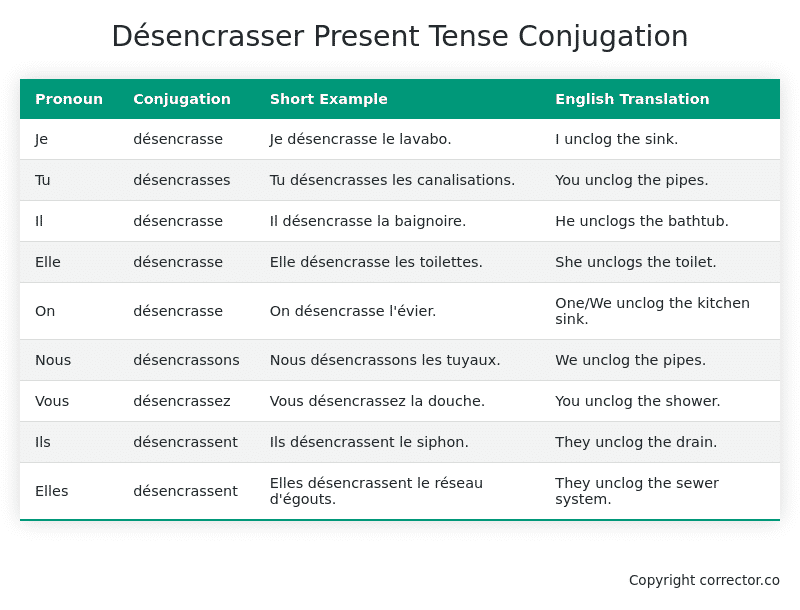Le Present (Present Tense) Conjugation of the French Verb désencrasser
Introduction to the verb désencrasser
The English translation of the French verb désencrasser is “to unclog” or “to dislodge.” The infinitive form, désencrasser, is pronounced as “day-zahn-krah-seh.”
Désencrasser is derived from the combination of the prefix “dés-” (meaning “un-” or “dis-“) and the verb “encrasser” (meaning “to clog” or “to get dirty”). It is often used in everyday French to describe the action of removing a blockage, cleaning, or getting rid of dirt or impurities from something.
Examples:
- J’ai utilisé un produit pour désencrasser les tuyaux de la salle de bains. (I used a product to unclog the bathroom pipes.)
- Il faut régulièrement désencrasser le filtre de la machine à laver. (It is necessary to regularly clean the filter of the washing machine.)
- Nous devons désencrasser le moteur de la voiture, il consomme trop d’essence. (We need to dislodge the car engine, it is consuming too much gas.)
Désencrasser – About the French Present Tense
To take a deep dive into all the French tenses then see our article on Mastering French Tense Conjugation.
Common Everyday Usage Patterns For Le Present
Interactions with Other Tenses
Table of the Present Tense Conjugation of désencrasser
| Pronoun | Conjugation | Short Example | English Translation |
|---|---|---|---|
| Je | désencrasse | Je désencrasse le lavabo. | I unclog the sink. |
| Tu | désencrasses | Tu désencrasses les canalisations. | You unclog the pipes. |
| Il | désencrasse | Il désencrasse la baignoire. | He unclogs the bathtub. |
| Elle | désencrasse | Elle désencrasse les toilettes. | She unclogs the toilet. |
| On | désencrasse | On désencrasse l’évier. | One/We unclog the kitchen sink. |
| Nous | désencrassons | Nous désencrassons les tuyaux. | We unclog the pipes. |
| Vous | désencrassez | Vous désencrassez la douche. | You unclog the shower. |
| Ils | désencrassent | Ils désencrassent le siphon. | They unclog the drain. |
| Elles | désencrassent | Elles désencrassent le réseau d’égouts. | They unclog the sewer system. |
Other Conjugations for Désencrasser.
Le Present (Present Tense) Conjugation of the French Verb désencrasser (You’re reading it right now!)
Imparfait (Imperfect) Tense Conjugation of the French Verb désencrasser
Passé Simple (Simple Past) Tense Conjugation of the French Verb désencrasser
Passé Composé (Present Perfect) Tense Conjugation of the French Verb désencrasser
Futur Simple (Simple Future) Tense Conjugation of the French Verb désencrasser
Futur Proche (Near Future) Tense Conjugation of the French Verb désencrasser
Plus-que-parfait (Pluperfect) Tense Conjugation of the French Verb désencrasser
Passé Antérieur (Past Anterior) Tense Conjugation of the French Verb désencrasser
Futur Antérieur (Future Anterior) Tense Conjugation of the French Verb désencrasser
Subjonctif Présent (Subjunctive Present) Tense Conjugation of the French Verb désencrasser
Subjonctif Passé (Subjunctive Past) Tense Conjugation of the French Verb désencrasser
Subjonctif Imparfait (Subjunctive Imperfect) Tense Conjugation of the French Verb désencrasser
Conditionnel Présent (Conditional Present) Tense Conjugation of the French Verb désencrasser
Conditionnel Passé (Conditional Past) Tense Conjugation of the French Verb désencrasser
Conditionnel Passé II (Conditional Past II) Tense Conjugation of the French Verb désencrasser
L’impératif Présent (Imperative Present) Tense Conjugation of the French Verb désencrasser
L’impératif Passé (Imperative Past) Tense Conjugation of the French Verb désencrasser
L’infinitif Présent (Infinitive Present) Tense Conjugation of the French Verb désencrasser
L’infinitif Passé (Infinitive Past) Tense Conjugation of the French Verb désencrasser
Le Participe Présent (Present Participle) Tense Conjugation of the French Verb désencrasser
Le Participe Passé (Past Participle) Tense Conjugation of the French Verb désencrasser
Struggling with French verbs or the language in general? Why not use our free French Grammar Checker – no registration required!
Get a FREE Download Study Sheet of this Conjugation 🔥
Simply right click the image below, click “save image” and get your free reference for the désencrasser present tense conjugation!

I hope you enjoyed this article on the verb désencrasser. Still in a learning mood? Check out another TOTALLY random French verb present conjugation!


